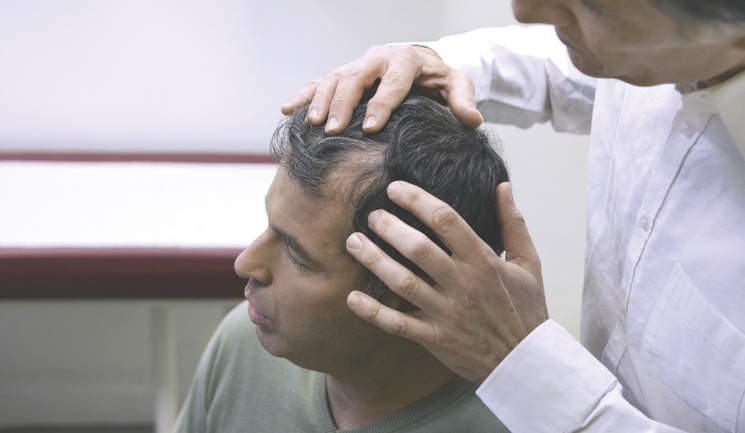Does smoking cause hair loss? Exploring the impact of cigarettes and nicotine
7th February 2025

It’s no secret that smoking is widely recognised as a leading cause of numerous health issues, including cancer, heart disease, and respiratory illnesses. But smoking’s detrimental impact extends beyond the major organs, affecting nearly every organ and system in the body – including your hair.
In this article, we’ll explore how smoking causes hair loss and highlight steps you can take to reduce damage to your hair.
Does smoking cause hair loss? Understanding the link
Cigarettes contain tobacco. Tobacco also comes in many other forms, including shisha, cigars, and pipes. When tobacco is burnt, the smoke produces thousands of harmful chemicals such as carbon monoxide and nicotine, which are then introduced into the body. These chemicals have a detrimental effect on the cardiovascular system and general health, disrupting many of the crucial bodily processes essential for maintaining healthy hair:
- Impaired blood circulation: Healthy hair follicles rely on a steady supply of oxygen and nutrients, which are carried by the blood. The chemicals in tobacco smoke cause blood vessels to narrow, reducing blood flow to the scalp and hair follicles. Chemicals such as carbon monoxide also bind to red blood cells, further limiting the blood’s ability to carry oxygen and nutrients to hair follicles.
- Oxidative stress: Smoking causes oxidative stress, which is when there is an excess of free radicals in the body. Free radicals are unstable molecules that can cause damage to the DNA in cells. Hair follicles are particularly vulnerable to oxidative stress, which can disrupt the normal hair growth cycle.
- Hormonal changes: In some women, smoking may lead to low levels of oestrogen. Oestogen is a key female sex hormone. Low oestrogen levels can impact overall hair health.
- Scalp health: Smoking also affects the skin, including the scalp, by reducing moisture levels and contributing to dryness and irritation. A dry scalp is more prone to conditions like dandruff, which can create an unhealthy environment for hair growth.
How can smoking affect the hair?
People who smoke may experience accelerated hair loss, especially if they are particularly prone to certain types of hair loss. A recent analysis of multiple studies found that people who smoke are significantly more likely to develop androgenetic alopecia, the most common form of hair loss – also known as male pattern hair loss.
As well as hair loss, the combined effects of smoking can lead to many other noticeable changes in hair, such as:
- Hair thinning
- Poor hair quality that is dull, brittle, and prone to split ends
- A poor hair growth environment
- Early onset of grey hair
Does nicotine cause hair loss?
Nicotine, the addictive chemical in cigarettes and other tobacco products, plays a significant role in the connection between smoking and hair loss. It is one of the key chemicals in tobacco smoke that constricts blood vessels and reduces blood flow to the scalp.
In theory, nicotine in nicotine replacement products and e-cigarettes may also damage hair health. As these are relatively new in the world of research, there’s no evidence yet to determine whether nicotine products directly cause hair loss. But it’s important to be aware of the potential risks of nicotine on hair loss.
However, it’s vital to note nicotine replacement products such as e-cigarettes and patches are much less harmful to your health overall than smoking. For people who smoke, these products can help them quit.
Tips if you concerned about hair loss
If you smoke and are worried about the impact of smoking on your hair, it’s never too late to take action:
-
Quit smoking
If you smoke, the best thing you can do to protect your hair and overall health is to stop smoking or using any tobacco products. Free, local stop smoking services can support you to stop smoking for good. You can also use tools like nicotine replacement therapies, e-cigarettes, and prescription medications to increase your chances of success.
Quitting smoking can significantly improve hair health and potentially reverse the damage to your hair. Stopping smoking can be tough, but it’s never too late to try and support is available.
-
Seek hair loss support from a professional
If you’re concerned about your hair health as a result of smoking, or if hair concerns persist after quitting smoking, it can be helpful to talk to a hair loss specialist. At The Maitland Clinic, our in-depth consultation process allows us to understand the root cause of your hair problems, and helps us identify the most suitable and effective treatment options.
Contact The Maitland Clinic for hair loss advice
So, does smoking cause hair loss? The evidence is clear: smoking and nicotine can disrupt blood flow and impair hair follicle function, leading to thinning, hair loss, and poor hair quality.
The good news is that quitting smoking can help stop further damage and, in many cases, improve the health of your hair over time. While recovery may vary, taking steps to quit smoking and prioritise scalp and hair care is one of the best investments you can make in your overall health.
For more support and information with your hair, or to start addressing hair loss concerns, get in touch with our expert team today.










